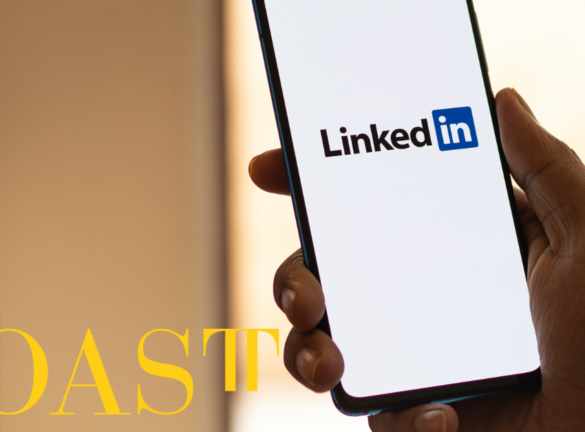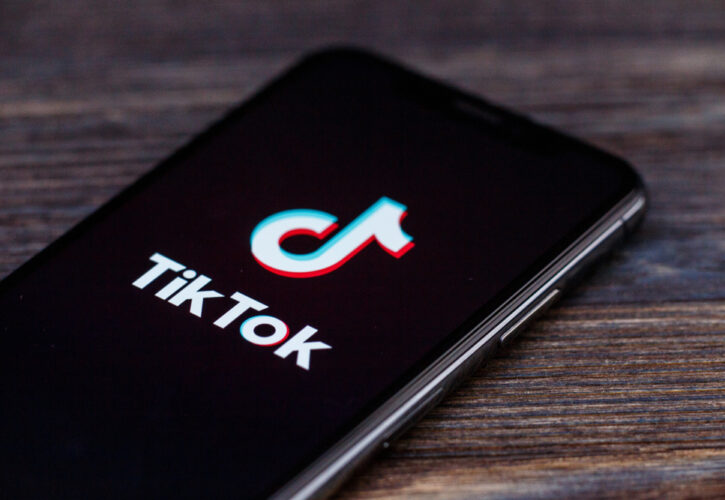
What’s the latest with TikTok controversies?
TikTok has been in the news again in March as discourse around privacy and data collection on the app continue to ramp up.
In case you missed it…
TikTok is owned by Chinese company Bytedance, of which the Chinese Government has a 1% stake in. Combined with a staggering amount of user data tracked in the app, this has caused concerns globally around how safe it is to have the app on mobiles, especially those in Government positions in other countries.
While many other tech companies such as Meta will often track similar amounts of data, largely to power their advertising business with 3rd party cookies, or track keystrokes to allow for troubleshooting of errors, the concern for many is the potential access of this data by a foreign government.
Theoretically, data may be passed on if requested as per China’s National Intelligence Law, and has been the spark of discussions around the usage of the app on government workers phones and is the core reason TikTok has been in the news so much. Their counter claim is that they do not request data located in other countries.
The UK Parliament already deleted and wiped the official account in August 2022 due to these concerns, and more recently London City Hall staff are no longer allowed to have the app on work phones as of March 2023. The Scottish and Welsh government are soon to follow suite, while France, Norway and the Netherlands are already there.
More recent headlines have come from TikTok CEO Shou Zi Chew appearing before congress this week to face a day of harsh questioning. In general, TikTok are keen to work with worldwide governments, notably the USA, to adjust processes and ensure data is not at risk – one method in progress is storing this data in the USA so it is not accessed by Chinese Engineers, but this isn’t yet set up.
What does it mean for advertisers?
While the concerns are largely focused on government officials at this point in time, there are still wider conversations about the use of the app for children, with a different set of safety concerns here. The app is addictive by nature, and in the last month TikTok announced a time limit of 60 minutes/day for users under 18 years old – however, this can be bypassed by entering a password to use the app further (and is therefore likely easy to circumvent). This leads into the second area of controversy about the impact on teenagers’ mental health – they are spending, on average, over 100 minutes a day on the app.
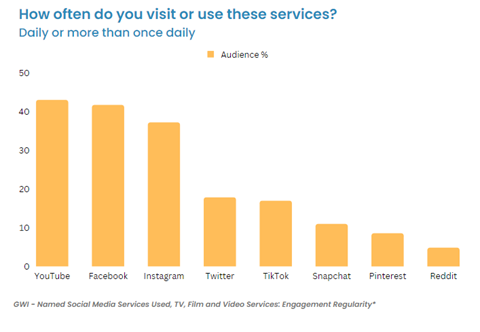
If these conversations continue without Bytedance providing sufficient and compelling evidence that there is no issue, this would massively shake up advertising on social media. TikTok is a full funnel marketing platform and media investment has continued to grow following product releases, improved algorithm sophistication and continual updates to creatives and audience opportunities -providing an option for everyone to advertise on the app. While their growth has absolutely overtaken their original competitor Snapchat, the removal of the app would leave a large hole in a lot of media plans.
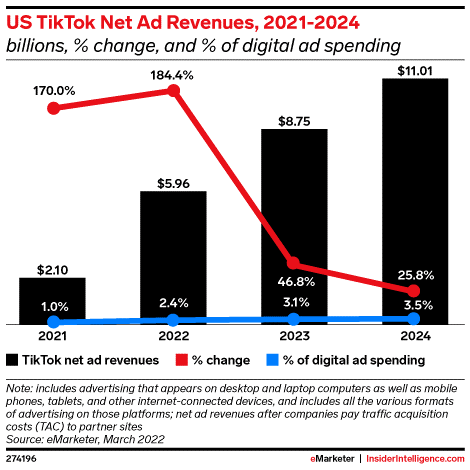
Source: https://www.insiderintelligence.com/content/us-tiktok-advertising-2022
Even in that unlikely scenario, shortform content won’t be going away. Meta and more specifically Instagram would likely come out as the winners, considering Reels are the next closest thing and have also seen growth since they launched in late 2020, through audience usage appears to be more stagnant as we’ve come into 2023. Another alternative is YouTube Shorts, later to the party this launched globally in July 2021 and has had good growth, crossing 50 billion daily views as of Q1 2023, this still lags behind Reels at 140 billion daily views.
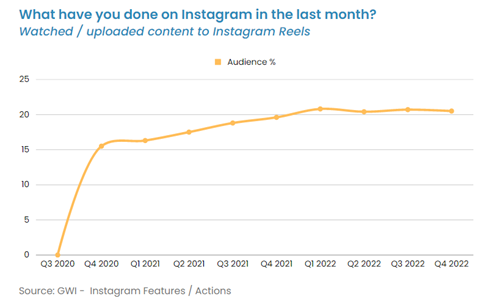
However, it isn’t completely farfetched considering the entire app is already banned in India since 2020 and that President Trump already tried to ban it in the USA at the same time, though it is likely more realistic that concessions would be made by Bytedance before this happened.
This remains a hot topic and an everchanging landscape for all social media companies, evidenced by the state of Utah recently signing a bill requiring parent permission for anyone under 18 to use social media (although not coming into force until 2024). At the same time, they are able to curfew usage and have access to their children’s posts.
This is all in an attempt to hold social media companies more accountable for the type of content users see and again is driven by the perception of declining mental health as a result of the apps. It will be well worth keeping an eye on the news as these situations develop and considering media plans accordingly, as well as looking at any new disrupters to the scene.
Additional sources:
https://www.bbc.co.uk/news/uk-england-london-65068651
https://www.bbc.co.uk/news/uk-politics-62410234
https://techcrunch.com/2023/02/03/google-says-youtube-shorts-has-crossed-50-billion-daily-views/
If you would like to learn more about how the most popular social platforms of the moment are setting the tone for the future of social media, please read here.





